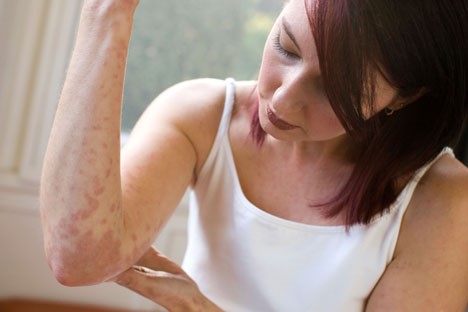6 Common Skin Problems Among Adults
Is your skin flaking, breaking out, itching or oozing? Break outs, scaling and eruptions are caused by many different types of skin disorders. Changes in the texture and colour of your skin can be the cause of an infection, an allergic reaction or inflammation anywhere in your body. While some of these skin issues can be minor and easily treated, others can be serious, and even fatal. Find out what those plaques, papules, scales and eruptions could possibly mean and what you can do to treat them.
- Psoriasis
This skin condition is often characterized by reddening and scaling of skin over the surfaces of knees, elbows, scalp, around the ears, navel, groin area or the buttocks. Psoriasis is an auto-immune skin condition that is caused by lymphocytes. Treatment options may include topical creams, prescribed bathing soap and exposure to UV light. If you develop this skin condition, make sure to see your GP or a dermatologist to come up with an effective medical solution.
- Cold Sore
Cold sore, also known as herpes labialis, is a skin condition caused by herpes simplex virus. This skin problem often appears on the edge of the lip. The virus exists in a dormant state but when triggered, such as by a cold or sunburn, the virus travels along a nerve to the same area of the skin again and again, leading to an eruption that normally lasts for about 10 days. Long treatments are deemed unnecessary unless the eruption happens too frequently.
- Shingles
These look like papules that turn into painful blisters over time. This skin condition causes your skin to itch, tingle, burn or become sensitive, and show up more often on the buttocks and trunk area of your body. Although an outbreak often lasts for only two weeks, a feeling of numbness and itching may linger for months or even years. Treatment for shingles includes topical creams, antiviral drugs, antidepressants and steroids.
- Eczema
Eczema is a non-contagious skin condition characterized by inflamed, scaly and itchy skin. Singapore doctors cannot really pinpoint what causes eczema to erupt in the first place, but some of the suspected reasons are stress, allergens, changes in the climate, and skin irritants like soaps. In adults, the scaling and flaking of skin due to eczema usually appears on the hands, elbows and areas where the skin folds, like the underarm area and the back of the knees. Several medications can treat eczema: some can be taken orally, others are applied on the skin.
- Pityriasis Rosea
A non-serious skin rash, pityriasis rosea often starts out as a scaly, pink patch, which is often raised and rough t the touch. After a couple of days to weeks, it starts to spread and feels very itchy. Doctors can’t exactly tell what’s causing the skin condition, but they do not think it’s contagious. This skin problem usually develops in people between 10 and 35 years. Even without medication, it goes away in a matter of weeks.
- Warts
Most of the time, warts appear on the face, hands and fingers, caused by the human papillomavirus. Warts is contagious and spread when you touch an item that has been used by a person with such virus. To prevent spread of warts to other areas of your body, cover it with bandage, always keep it dry and do not pick on them. These scaly bumps are usually painless and harmless. You can treat it with topical creams or a doctor can burn them off or freeze them. More advanced techniques include lasers, surgery and chemical removal.
There’s an array of skin disorders and issues that can plague us, but no need to worry as treatment options for most of these conditions have greatly improved over time. If you suspect you have any of these skin conditions, have it checked by a dermatologist right away to get the best treatment option for you.


